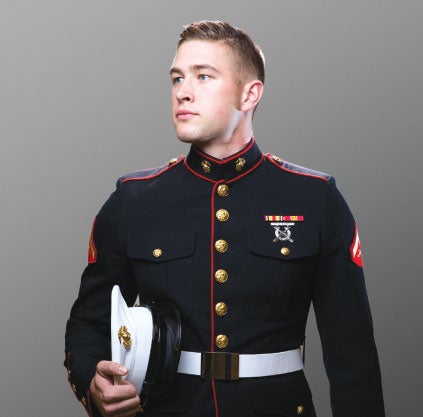 If his close-cropped haircut doesn’t give him away, his vise-grip handshake and his booming voice are likely to reveal that Caleb Bubash is not your typical college student: He’s also a U.S. Marine.
If his close-cropped haircut doesn’t give him away, his vise-grip handshake and his booming voice are likely to reveal that Caleb Bubash is not your typical college student: He’s also a U.S. Marine.
And if that alone is not enough to make you take notice, you should know that Bubash, a senior business administration major, is among the best of the best: He was recently awarded the 2015 Marine Corps Commandant’s Trophy, a prestigious honor bestowed annually upon the top graduate from the corps’ Officer Candidate School (OCS) in Quantico, Va.
The 10-week training program is designed to test – and weed out – those who think they have what it takes to lead other Marines in battle. Based on his excellent academic performance, physical fitness and leadership, Bubash was singled out for the award among hundreds of other officer candidates in 2015. He is the first College of Charleston student to earn the award.
“I had no idea right until the point they told me,” he says of the appointment. “I just worked hard.”
Upon his graduation from the College this spring, Bubash will officially become a commissioned officer in the Marines. And about two weeks after commencement, he’ll marry his fiancée, Nicole Newman ’14.
A native of Easley, S.C., Bubash says he’s always wanted to be a Marine, and he’s had plenty of inspiration from other family members who’ve served in the military, including his older brother, a first lieutenant stationed at Camp Lejeune, N.C. Bubash was so intent on becoming a Marine that he planned to enlist right out of high school before his parents and brother talked him out of it, encouraging him to attend college first and enter the Marines as an officer. After heading to The Citadel in 2011, he wound up enlisting in the Marine Corps Reserve, where he currently holds the rank of lance corporal. After two years at the military college and a one-year stint working construction, he transferred to the College in 2014.
“I went to boot camp after my knob year at The Citadel,” he says. “I decided that would be good experience if I wanted to be an officer.”
But as difficult as boot camp was, OCS was even harder. A 4:30 a.m. wake-up, followed by physical training, drilling, land navigation, obstacle courses, road marches, classroom instruction and other demanding tasks would leave him and his fellow candidates struggling to keep their eyes open.
Physically and mentally exhausted and wanting only to catch a few winks before the next morning’s wake-up, Bubash learned to push through fatigue, to crack his books and study for the numerous tests he had to take on topics ranging from military tactics and customs to courtesies and uniforms.
“That’s what makes OCS the hardest, I think, is doing the academics,” Bubash says. “You are mentally exhausted and you have to push through it, and you have to decide if you really want to be there.”
Marine Corps Capt. Brian Deiters, who has trained and mentored Bubash, says emerging as the top officer candidate among the hundreds of other top-notch men and women who endure the training each year is no small feat.
“It’s a huge award because if you go back 100 years, there’s only one student who’s received it every year,” says Deiters.
Since winning the Commandant’s Trophy and returning to classes at the College this spring semester as well as his part-time job as an assistant accountant, Bubash says he has an even greater appreciation for how much freedom and free time a typical college student enjoys.
“It’s a huge change going from OCS back to here,” he says. “You realize that with the academics here, all you have to do is work hard, whereas at OCS it was exhausting. We have a lot more free time here than we often think we do.”
While Bubash was a good student before he left for OCS in the summer of 2015, his transformation since then is quite obvious to Angela Passarelli, an assistant professor of management and marketing in the School of Business who has taught Bubash in two courses.
“He has a different sense of purpose about him,” says Passarelli. “He has a role and he knows that he’s going to have a huge responsibility. That realization for him has provided a lot of focus and maturity that I don’t see other students having yet at this point in their senior year.”
Capt. Deiters says the honor that Bubash won reflects positively on the College of Charleston’s liberal arts and sciences curriculum, particularly the manner in which its students are taught to think critically and synthesize information.
“When you think about it, the essence of a Marine officer is his or her ability to take information, make a decision and communicate that decision and act,” he says. “They’ve been trained for four years of college in this, and it actually translates well into being a Marine Corps officer.”
While some of his courses at the College, such as theatre and philosophy, might not mesh with the stereotype of a hard-charging Marine, Bubash believes strongly that his liberal arts and sciences education will ultimately make him a better leader of other Marines.
“Just because you are at a liberal arts school doesn’t mean you can’t go into the military and succeed,” says Bubash. “I’m one of those examples.”





